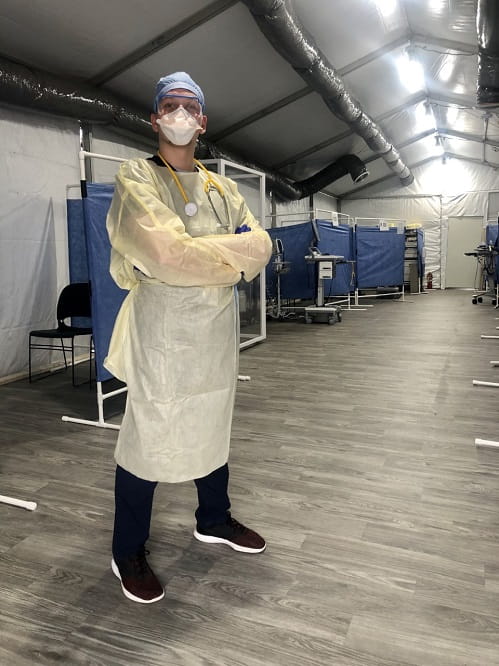Wearing many hats to treat COVID-19
Temporarily reassigned due to the pandemic, physician assistant Corey Rossi’s new role takes him from working inside the Emergency Department to outside of it.
Certified physician assistant Corey Rossi has his fair share of excitement working in the Emergency Department at Geisinger Wyoming Valley Medical Center. But these days, his job looks a little different. Hours once filled caring for people in the emergency room are now spent in the screening tents at Geisinger South Wilkes-Barre and Geisinger Wyoming Valley Medical Center, screening and treating those who come to the hospital with coronavirus symptoms.
“Normally, I work in the Emergency Department providing care for patients experiencing medical emergencies. Now my duties include screening and treating patients with respiratory symptoms, whether it be COVID-related or from other causes,” says Mr. Rossi.
The pace is fast but different. But he is up for the challenge, seeing as many as 25 patients during an 8-hour shift. As he works to screen those who come for treatment, Mr. Rossi uses his positive attitude to keep people calm.
“I make sure to show the patients who are scared the numbers on the CDC website. I show them the number of patients worldwide who have contracted the virus and then the number who have fully recovered. It’s always better to look at the cup as half-full rather than half-empty.”
After their visit, every patient receives a handout that summarizes their diagnosis and provides instructions to treat their condition at home. They also receive education on proper hand washing, eating a healthy diet, how to practice social distancing and what it means to quarantine at home. By following these guidelines, Mr. Rossi says people significantly reduce the risk of transmission and protect themselves and others from becoming infected.
“By utilizing the support system I have, including my colleagues and family, I’m able to stay optimistic and deliver the best care to each patient,” Mr. Rossi says.
He offers this piece of advice:
“We are all in this together! We all play a crucial role in the care of our patients. Our team is well-trained and although this is a scary time, we will get through this together. Stay positive and hopeful!”
Staying calm among the chaos
Relatively new to the Geisinger family before the pandemic hit our area, Mr. Rossi started his current role in December 2019. He says the way he delivers care has changed in those few months.“Normally, I work in the Emergency Department providing care for patients experiencing medical emergencies. Now my duties include screening and treating patients with respiratory symptoms, whether it be COVID-related or from other causes,” says Mr. Rossi.
The pace is fast but different. But he is up for the challenge, seeing as many as 25 patients during an 8-hour shift. As he works to screen those who come for treatment, Mr. Rossi uses his positive attitude to keep people calm.
“I make sure to show the patients who are scared the numbers on the CDC website. I show them the number of patients worldwide who have contracted the virus and then the number who have fully recovered. It’s always better to look at the cup as half-full rather than half-empty.”
Education is key
Each person coming to the emergency room, whether for COVID-related symptoms or not, must stop at the tent where they are screened for COVID-19. Here, they are evaluated and asked about their symptoms. Those experiencing respiratory symptoms, such as shortness of breath or a fever of 100.4 F, are treated right in the tent. Others are sent for additional testing, such as a chest X-ray or lab work. If needed, medications are ordered.After their visit, every patient receives a handout that summarizes their diagnosis and provides instructions to treat their condition at home. They also receive education on proper hand washing, eating a healthy diet, how to practice social distancing and what it means to quarantine at home. By following these guidelines, Mr. Rossi says people significantly reduce the risk of transmission and protect themselves and others from becoming infected.
Getting by with a little help from his friends
To help stay healthy, Mr. Rossi says he gets plenty of exercise and eats well. He also washes his hands frequently and tries to unplug outside of work whenever he can. His family and friends allow him to vent his fears and frustrations, as well as help him feel “level.”“By utilizing the support system I have, including my colleagues and family, I’m able to stay optimistic and deliver the best care to each patient,” Mr. Rossi says.
He offers this piece of advice:
“We are all in this together! We all play a crucial role in the care of our patients. Our team is well-trained and although this is a scary time, we will get through this together. Stay positive and hopeful!”

Content from General Links with modal content

